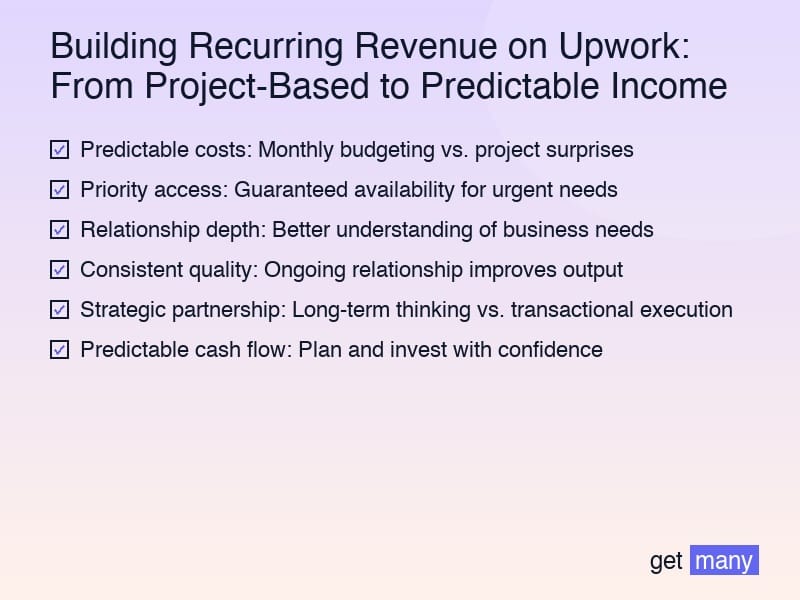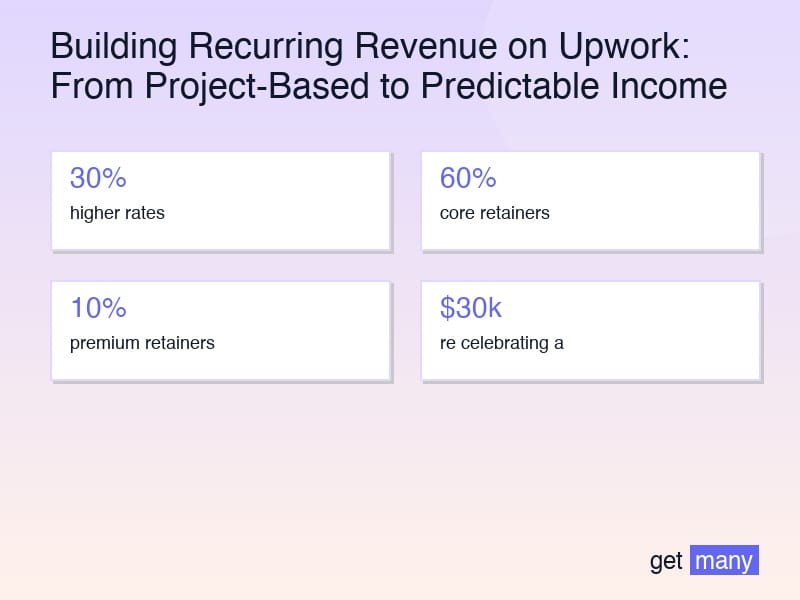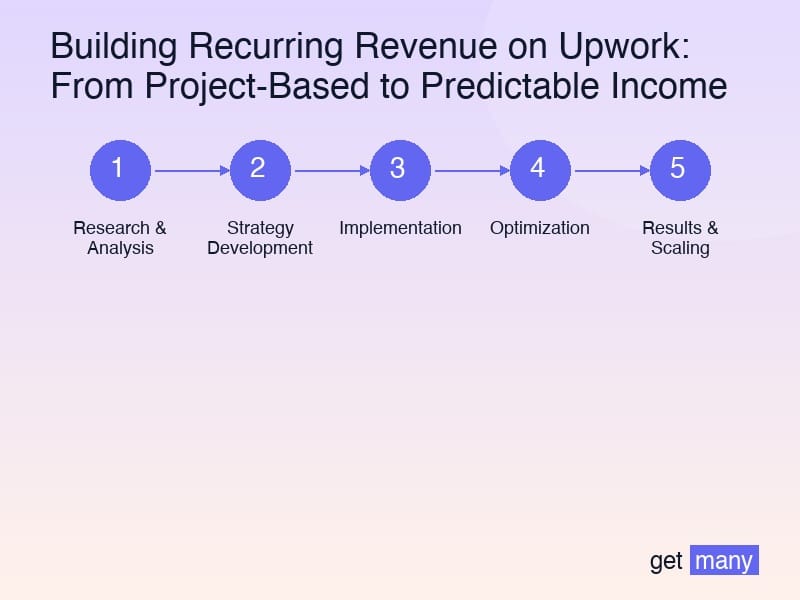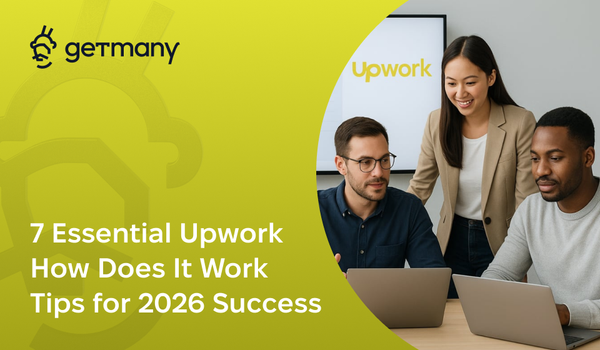Building Recurring Revenue on Upwork: From Project-Based to Predictable Income
Transform your agency from feast-or-famine cycles to predictable monthly revenue. The proven systems for building retainer relationships on Upwork.
The feast-or-famine cycle destroys more agencies than any other challenge. One month you're celebrating a $30k month, the next you're scrambling to make payroll. The solution isn't working harder—it's building recurring revenue streams that provide predictable, sustainable income.
After analyzing 1,000+ successful agency transitions from project-based to retainer-based revenue, I've identified the exact systems and strategies that create stable, scalable income streams on Upwork. This isn't theoretical—it's the proven framework that transforms agencies from unpredictable project hunters into stable, growing businesses.
The Psychology of Recurring Revenue

Why Clients Prefer Retainers
Contrary to what many agencies believe, clients often prefer retainer relationships when positioned correctly:
Client benefits:
- Predictable costs: Monthly budgeting vs. project surprises
- Priority access: Guaranteed availability for urgent needs
- Relationship depth: Better understanding of business needs
- Consistent quality: Ongoing relationship improves output
- Strategic partnership: Long-term thinking vs. transactional execution
The Agency Transformation
Project-based mindset: "How can I deliver this project?" Retainer mindset: "How can I become indispensable to this client's success?"
This shift changes everything about how you approach client relationships, pricing, and service delivery.
The Retainer Revenue Model

Understanding Retainer Economics
Monthly recurring revenue (MRR) becomes your foundation:
- Predictable cash flow: Plan and invest with confidence
- Scalable growth: Add new retainers without replacing old ones
- Higher lifetime value: Clients typically stay 12-24 months
- Reduced acquisition costs: Less time spent on new business
- Premium pricing: Retainers command 15-30% higher rates
The Retainer Revenue Equation
Monthly Retainer Value × Client Count × Average Retention = Annual Recurring Revenue
Example:
- Average retainer: $5,000/month
- Client count: 8 retainers
- Average retention: 18 months
- Annual recurring revenue: $720,000
Phase 1: Retainer-Ready Foundation

Service Optimization for Retainers
Not all services work well as retainers. Focus on:
Ideal retainer services:
- Ongoing maintenance: Website updates, security monitoring
- Content creation: Blog posts, social media management
- Marketing campaigns: SEO, PPC management, email marketing
- Consulting: Strategic advisory, business development
- Support services: Customer service, technical support
Poor retainer services:
- One-time projects: Logo design, website builds
- Seasonal work: Tax preparation, holiday campaigns
- Completion-based: Research projects, audits
Positioning for Recurring Work
Language transformation:
- Instead of: "I'll build your website"
- Say: "I'll manage your digital presence"
- Instead of: "I'll write your blog posts"
- Say: "I'll develop your content strategy"
- Instead of: "I'll run your ads"
- Say: "I'll optimize your customer acquisition"
The Retainer Proposal Framework
Section 1: Strategic Understanding
- Current business challenges
- Growth objectives
- Success metrics
Section 2: Ongoing Value Delivery
- Monthly deliverables
- Continuous optimization
- Strategic recommendations
Section 3: Investment Structure
- Monthly retainer amount
- Included services
- Performance guarantees
Section 4: Partnership Approach
- Regular communication schedule
- Reporting and transparency
- Scalability planning
Phase 2: Converting Existing Clients
The Transition Strategy
Step 1: Audit Your Current Clients Identify clients who:
- Have ongoing needs in your service area
- Value your work and pay promptly
- Are experiencing growth or change
- Have budget for continuous investment
Step 2: The Retainer Conversation Timing: Near the end of successful projects Approach: Focus on future needs, not current project
Conversation script: "I've really enjoyed working on [project] with you. As I think about [client's business], I see some opportunities for ongoing support that could really accelerate your growth. Would you be open to discussing how we might work together on a more regular basis?"
Step 3: Retainer Proposal Development
- Analyze current project scope: What could be ongoing?
- Identify additional opportunities: What else do they need?
- Create value bundles: Combine services for better pricing
- Propose trial periods: 3-month initial retainer
The Transition Timeline
Month 1: Audit clients and identify opportunities Month 2: Have retainer conversations with top prospects Month 3: Implement first retainer agreements Month 4-6: Optimize delivery and expand offerings
Phase 3: Building Retainer-First Business Development
Prospecting for Retainer Clients
Target client characteristics:
- Growing businesses: Need ongoing support
- Established companies: Have budget for continuous investment
- Complex operations: Multiple ongoing needs
- Strategic thinkers: Value long-term partnerships
The Retainer-First Proposal Process
Discovery phase:
- Understand ongoing business needs
- Identify continuous improvement opportunities
- Assess current gaps and challenges
- Evaluate growth plans and timelines
Proposal development:
- Position as strategic partner, not service provider
- Emphasize continuous value delivery
- Include performance metrics and reporting
- Offer scalable service levels
Retainer Pricing Strategies
Model 1: Fixed Monthly Investment
- Set price for defined scope
- Predictable for both parties
- Clear boundaries and expectations
Model 2: Tiered Service Levels
- Basic, Standard, Premium options
- Easy to scale up or down
- Clear value differentiation
Model 3: Performance-Based Retainers
- Base retainer + performance bonuses
- Aligned incentives
- Higher potential revenue
Advanced Retainer Strategies
The Retainer Ecosystem
Core services: Primary value delivery Add-on services: Additional revenue opportunities Strategic consulting: High-value advisory work Emergency support: Premium rates for urgent needs
Retainer Optimization Techniques
Value stacking: Combine complementary services Efficiency improvements: Streamline delivery processes Results amplification: Focus on high-impact activities Relationship deepening: Become indispensable partner
The Retainer Renewal Process
Monthly check-ins: Regular performance reviews Quarterly business reviews: Strategic planning sessions Annual contract renewals: Scope and pricing adjustments Expansion conversations: Additional service opportunities
Technology Stack for Retainer Management
Client Management Systems
CRM integration: Track retainer performance and renewal dates Project management: Organize ongoing deliverables Communication tools: Regular client interaction Reporting systems: Monthly performance reporting
Financial Management
Recurring billing: Automated monthly invoicing Cash flow tracking: Monitor retainer revenue Profitability analysis: Optimize retainer margins Financial forecasting: Plan based on recurring revenue
Service Delivery Optimization
Template systems: Standardize deliverables Quality control: Consistent output standards Efficiency tools: Streamline routine tasks Performance monitoring: Track client success metrics
Common Retainer Mistakes
Mistake 1: Underpricing Retainers
Problem: Treating retainers as discounted projects Solution: Price for ongoing value, not time
Mistake 2: Scope Creep
Problem: Unclear boundaries lead to unprofitable work Solution: Define scope clearly and manage changes
Mistake 3: Neglecting Relationship Management
Problem: Treating retainers as autopilot revenue Solution: Regular communication and value demonstration
Mistake 4: One-Size-Fits-All Approach
Problem: Same retainer structure for different clients Solution: Customize retainers to client needs
Mistake 5: Poor Performance Tracking
Problem: No measurement of retainer success Solution: Regular reporting and optimization
Industry-Specific Retainer Opportunities
Digital Marketing Agencies
Retainer services:
- SEO optimization and reporting
- Social media management
- Content creation and distribution
- Paid advertising management
- Email marketing campaigns
Development Agencies
Retainer services:
- Website maintenance and updates
- Security monitoring and patches
- Performance optimization
- Feature development and enhancements
- Technical support and troubleshooting
Design Agencies
Retainer services:
- Brand management and guidelines
- Marketing collateral creation
- Website design updates
- Packaging design iterations
- Brand consistency monitoring
Content Agencies
Retainer services:
- Blog content creation
- Social media content
- Email newsletter development
- Video content production
- Content strategy development
The Getmany Advantage for Retainer Building
Building retainer relationships requires consistent new business development alongside client retention. Getmany accelerates this process by:
Automated prospecting: Identify retainer-ready clients automatically Retainer-focused proposals: Templates optimized for recurring work Relationship management: Track client interactions and renewal dates Performance optimization: Analyze what works for retainer success
This automation frees up time to focus on client relationship building and service delivery optimization.
Measuring Retainer Success
Key Performance Indicators
Financial metrics:
- Monthly recurring revenue (MRR)
- Average retainer value
- Retainer profit margins
- Customer lifetime value
Operational metrics:
- Client retention rate
- Retainer renewal percentage
- Scope expansion rate
- Service delivery efficiency
Client satisfaction metrics:
- Net promoter score (NPS)
- Client satisfaction ratings
- Referral generation
- Testimonial quality
Reporting and Analysis
Monthly retainer reports:
- Revenue performance
- Client satisfaction scores
- Service delivery metrics
- Renewal pipeline status
Quarterly business reviews:
- Retainer portfolio analysis
- Growth opportunities identification
- Client relationship assessment
- Strategic planning updates
Scaling Your Retainer Business
The Retainer Growth Model
Phase 1: 3-5 retainers ($15k-$25k MRR) Phase 2: 6-10 retainers ($30k-$50k MRR) Phase 3: 10-15 retainers ($50k-$75k MRR) Phase 4: 15+ retainers ($75k+ MRR)
Scaling Strategies
Service standardization: Create repeatable processes Team development: Build capability to handle more clients Technology leverage: Automate routine tasks Partnership development: Collaborate with complementary providers
The Retainer Portfolio Management
Client mix optimization:
- 60% core retainers (stable, predictable)
- 30% growth retainers (expanding scope)
- 10% premium retainers (high-value, strategic)
Financial Planning with Retainer Revenue
Cash Flow Management
Benefits of retainer revenue:
- Predictable monthly income
- Reduced collection risk
- Improved cash flow planning
- Enhanced business valuation
Investment Strategy
Reinvestment priorities:
- Team expansion for capacity
- Technology for efficiency
- Marketing for growth
- Client experience improvements
Risk Management
Retainer portfolio diversification:
- Industry diversification
- Client size variety
- Service area spread
- Geographic distribution
Your Retainer Transformation Roadmap
Month 1-2: Foundation Building
- Audit existing clients for retainer potential
- Develop retainer service packages
- Create proposal templates
- Set up systems and processes
Month 3-4: Client Conversion
- Approach existing clients with retainer offers
- Implement first retainer agreements
- Optimize service delivery processes
- Track performance metrics
Month 5-6: Business Development
- Develop retainer-focused prospecting
- Create ongoing marketing for retainer services
- Build referral programs
- Expand service offerings
Month 7-12: Scale and Optimize
- Analyze retainer performance data
- Optimize pricing and packaging
- Expand team capacity
- Plan for continued growth
The Bottom Line
Recurring revenue isn't just a nice-to-have—it's essential for building a sustainable, scalable agency. The agencies that master retainer relationships enjoy predictable income, deeper client relationships, and significantly higher business valuations.
The transition from project-based to retainer-based revenue requires strategic thinking, systematic execution, and patience. But the results—stable cash flow, reduced stress, and scalable growth—make the effort worthwhile.
Start with your existing clients, perfect your retainer delivery, and then expand to new retainer-focused business development. Within 12 months, you can transform your agency from a feast-or-famine operation into a predictable, profitable business.
Remember: Retainers are about ongoing value delivery, not just recurring payments. Focus on becoming indispensable to your clients' success, and the recurring revenue will follow.
Ready to build predictable recurring revenue? Getmany can help you identify retainer-ready clients and create compelling proposals that position you as a strategic partner rather than a project vendor. Start your transformation to recurring revenue today.





